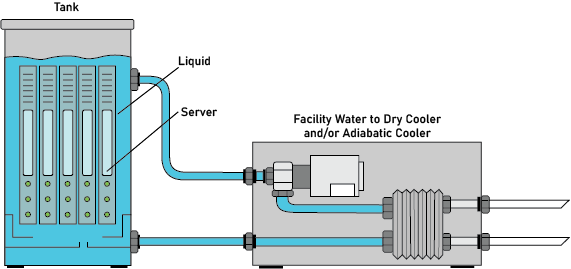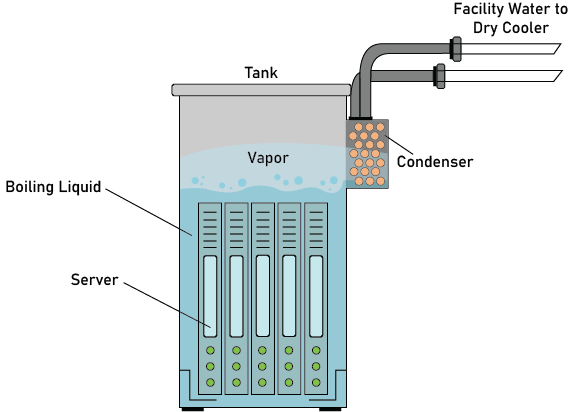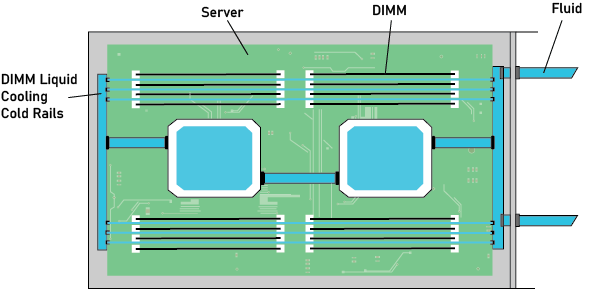Immersion Cooling - Industrial Applications
SF 7100™ Engineered Fluid
SF 7100™ Engineered Fluid for Industrial Cooling Applications
SF 7100 fluid is designed to meet the growing need for effective heat transfer solutions in various industrial cooling applications. It provides a safe, efficient, and environmentally friendly alternative to traditional cooling substances.
What is SF 7100 Fluid?
SF 7100 fluid is a versatile hydrofluoroether (HFE) fluid known for its exceptional performance in applications requiring non-flammability, low toxicity, and environmental sustainability. This fluid excels in thermal management, electronics cooling, and a wide range of other industrial applications.
The following properties make SF 7100 fluid particularly suited to specialized high-temperature and electrically sensitive applications:
- Boiling Point: Higher boiling point (61°C) suitable for high-temperature applications.
- Molecular Weight: Lower molecular weight (250 g/mol) enhances heat transfer efficiency.
- Critical Temperature and Pressure: Higher critical temperature (195°C) and pressure (2.23 MPa) for robust performance under extreme conditions.
- Dielectric Constant: Higher dielectric constant (7.4) ideal for applications requiring greater electrical insulation.
- Unique application profile, including:
- Electronics testing and cleaning.
- Lubricant deposition.
- Aerospace and military use due to stability across temperature extremes.
Optimizing Industrial Cooling with SF 7100 Fluid
Implementing SF 7100 fluid in immersion cooling systems enhances efficiency, reduces operational costs, and minimizes environmental impact throughout the entire lifecycle of industrial systems — from initial design and construction to ongoing maintenance.
Advanced Immersion Cooling with SF 7100 Fluid
Immersion cooling using SF 7100 fluid involves submerging electronic components in a non-conductive liquid. This method allows for direct and efficient heat transfer, eliminating the need for traditional cooling components like heat sinks and fans. It provides a streamlined, effective alternative to conventional cooling methods.
Strategic Performance, Cost, and Sustainability Enhancements
Global Efficiency: Deploy cooling systems effectively across different locations with consistent infrastructure.
Scalable Solutions: Optimize scalability with compact systems and straightforward designs, removing the need for complex airflow management.
Cost Savings: Reduce both capital and operational expenses by minimizing reliance on traditional air-cooling systems.
Sustainable Operations: Achieve low Power Usage Effectiveness (PUE) and conserve water with single-phase or two-phase immersion cooling.
Applications
Enhanced Cooling Performance: SF 7100 fluid provides superior cooling for high-density servers and electronic equipment in data centers.
Cost Reduction: Lower operational costs by reducing the need for traditional air-cooling systems.
Environmental Sustainability: Achieve lower Power Usage Effectiveness (PUE) and eliminate water waste.

High Performance: Efficient cooling of high-performance computing systems to support demanding workloads.
Increased Efficiency: Higher performance per watt and improved energy efficiency.

Improved Reliability: Maintain optimal temperatures to enhance hardware reliability and longevity.
Reduced Latency: Minimize thermal throttling and improve system performance.

Adaptable Solutions: Deploy adaptable cooling systems for edge and 5G applications with consistent performance.
High-Density Units: Support high-density edge units with efficient cooling solutions.

Enhanced Mining Performance: Efficient cooling for cryptocurrency mining operations, improving performance per watt.
Reduced Costs: Lower operational costs by eliminating traditional air-cooling infrastructure.

SF 7100 fluid is widely used in heat transfer systems, including thermal management for semiconductor fabrication, data center cooling, and other industrial processes requiring efficient heat dissipation. Its high dielectric strength and thermal conductivity make it ideal for maintaining optimal operating temperatures.

SF 7100 fluid is effective in electronics testing and cleaning applications due to its non-flammability and low toxicity. It helps maintain clean, contaminant-free surfaces on sensitive electronic components, ensuring reliability and performance in various testing environments.

Used as a carrier solvent in lubricant deposition, SF 7100 fluid facilitates the precise application of lubricants on components. Its compatibility with various materials and low surface tension make it suitable for intricate deposition processes.

SF 7100 fluid’s stability at high temperatures and low viscosity at low temperatures make it suitable for aerospace and military applications, where reliable performance under extreme conditions is crucial. Its non-flammable nature and environmental benefits further enhance its suitability for these sectors.

Liquid Cooling Solutions Enabled by Standard Fluids
Standard Fluids’ innovative solutions support both single-phase and two-phase immersion cooling, as well as direct-to-chip applications.

Single-Phase Immersion Cooling: Submerge electronic components in a dielectric liquid, where the fluid remains in its liquid phase. Heat transfer occurs directly from the components to the fluid, which is then circulated to a heat exchanger for cooling.
Two-Phase Immersion Cooling: Utilizes the boiling and condensation of the fluid to enhance heat transfer efficiency. Electronic components are immersed in a dielectric liquid, where the heat causes the fluid to boil and vaporize. The vapor condenses on a heat exchanger, transferring heat to facility water.


Direct-to-Chip Cooling: Circulate fluid through cold plates attached to electronic components, without direct contact with the electronics. This method can employ both dielectric and non-dielectric fluids.
Physical Properties
Boiling Point: 61°C
Pour Point: -135°C
Molecular Weight: 250 g/mol
Critical Temperature: 195°C
Critical Pressure: 2.23 MPa
Vapor Pressure: 27 kPa
Heat of Vaporization: 112 kJ/kg
Liquid Density: 1510 kg/m³
Coefficient of Expansion: 0.0018 K⁻¹
Kinematic Viscosity: 0.38 cSt
Absolute Viscosity: 0.58 cP
Specific Heat: 1183 J/kg-K
Surface Tension: 13.6 mN/m
Solubility of Water in Fluid: 95 ppm by wt
Dielectric Strength 0.1″ gap: >25 kV
Dielectric Constant @ 1kHz: 7.4
Volume Resistivity: 10¹² Ohm-cm
Global Warming Potential (GWP):297
Compatibility and Stability
SF 7100 fluid is compatible with a broad spectrum of construction materials, eliminating the need for specialized piping or handling systems. Its stability in storage and high dielectric constant ensure safe, direct contact in most electronics and computing applications.
Environmental Health and Safety
This product has been rigorously evaluated to confirm its minimal environmental impact. With a low global warming potential, its potential to affect climate change is significantly limited. The atmospheric breakdown of SF 7100 fluid produces by-products that do not harm the stratospheric ozone layer, affirming its ozone depletion potential of zero.
Resources and Support
Standard Fluids offers global support for SF 7100 fluid, with dedicated sales, technical, and customer service resources. Our technical service laboratories in the U.S., Europe, Japan, Latin America, and Southeast Asia are committed to providing ongoing support.
SF 7100 Resources
Immersion cooling involves submerging electronic components directly into a dielectric liquid such as SF 7100 fluid, allowing for efficient heat transfer and eliminating the need for traditional cooling components.
Immersion cooling offers increased thermal efficiency, enhanced performance, and improved system reliability, reducing the need for complex airflow management and lowering capital and operational expenses.
Immersion cooling submerges IT hardware in a dielectric liquid. Direct-to-chip cooling circulates fluid through cold plates attached to electronic components.
Users should consider tank design, fluid containment, material compatibility, and fluid hygiene. Two-phase immersion cooling offers greater heat transfer efficiency and typically requires less complex cooling infrastructure.

